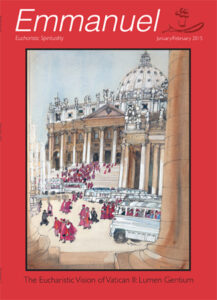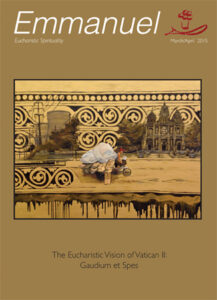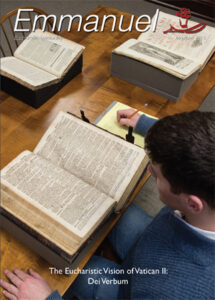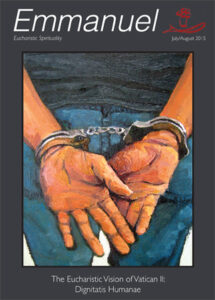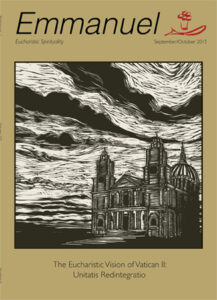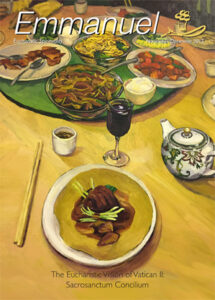Emmanuel Magazine Archives
2015
I suggest you begin by reading Father John Kamas’ fine retrospective on Vatican II and then turn to Father Paul Bernier’s incisive article on the first of the “magnificent seven” — Lumen Gentium, the Dogmatic Constitution on the Church. LG defines who and what the church is, as articulated by the bishops of Vatican II under the inspiration of the Holy Spirit. And enjoy Bishop Robert Morneau’s brief yet powerful reflection on Lumen Gentium.
When we think of the church, all of us are aware of and humbled by the divisions that have set Christians at odds with each other and blunted the church’s mission effectiveness. Deacon Owen Cummings introduces us to the efforts of the late Jesuit ecumenist Michael Hurley to bring healing and hope amid the sectarian violence and mistrust of his native Ireland and beyond.
January 31st is the centennial of the birth of Thomas Merton, the beloved Trappist monk, writer, and activist who died prematurely in 1968 at the age of 53. Reverend Victor Parachin offers a wonderful overview of Merton’s life, his interior journey, and his passion for holiness and truth, complete with quotes from his writings.
Paul J. Wadell is our guide to exploring Gaudium et Spes, the last of the conciliar documents to be promulgated at Vatican II on December 7, 1965. His article is so beautiful a summary of the decree’s core ideas and teachings that you might want to read it slowly and savor it. Father Norman Pelletier looks at Gaudium et Spes through a very particular lens — that of religious life. He has spent many years in leadership of the Congregation of the Blessed Sacrament on the international and provincial levels.
The three short articles in the Eucharist: Living & Evangelizing section touch on a variety of topics: the origins of the Eucharist (Niranjan Rodrigo), its ongoing challenge and transforming power (Frank A. Squitteri), and the reverence which has been shown the mysterium fidei through the ages (David W. T. Brattston).
Victor M. Parachin suggests 24 very practical ways to enrich your Gospel living and spirituality this Lent. The church’s great penitential season has always been about renewing the quality of our Christian discipleship by getting back to the basics. By doing so, and by God’s patience and grace, we will arrive at the new life of Easter. The nourishment of word and sacrament sustain us on the way.
Robert J. Nogosek, CSC, who was present at Vatican II as an invited theologian, has written a very clear article enumerating the core ideas and teachings of Dei Verbum and helping us understand, from the perspective of someone who was actually there, how the decree gradually took shape as it moved through three revisions to its final form. Complementing Father Nogosek’s summary is a very personal reflection by James W. Brown on his experience of engaging the Scriptures and undertaking biblical studies after the council.
Also in Eucharistic Teachings, Dennis Billy, CSsR, introduces us to the distinguished abbot, spiritual writer, and liturgist Don Columba Marmion.
You will also find shorter articles on Trinitarian theology (David H. Powell) and the notion of sacrifice in the Judeo-Christian tradition and today (Hugh Cleary, CSC). The solemnity of the Most Holy Trinity is observed on Sunday, May 31, this year and the Most Holy Body and Blood of Christ (Corpus Christi) on the following Sunday, June 7. May these reflections enrich your celebration of these two title feasts!
Catholic social teaching was integral to the new relationship between church and world defined by the bishops of Vatican II. Present in many council documents, our particular lens in this issue of Emmanuel is Dignitatis Humanae and its conviction that the rights, dignity, and duties of the human person flow from his or her relationship to God.
I suggest you start with Lisa Marie Belz, OSU’s excellent article and then move to Robert S. Pelton, CSC’s reflection on the Chilean church’s experience of the council and its continuing challenges for the Catholic Church in that country today.
On February 3, Pope Francis signed a decree declaring Salvadoran Archbishop Oscar Romero a martyr for the faith and a witness to gospel principles of justice and reconciliation. Victor Parachin has penned a moving tribute to this humble man who sought to be the voice of the voiceless in a time of great suffering for his people. He died at the altar while celebrating Mass.
In Eucharistic Teachings, Dennis Billy, CSsR, introduces us to the Dominican friar, priest, and theologian Yves Congar. You will also find scriptural reflections for homiletic preparation and personal prayer as well as poetry and reviews, etc., in the Eucharist & Culture section.
Our September/October issue typically focuses on the church’s mission and ministries. Here we cut a broad swath rather than a measured one.
A good place to begin is by reading Ernest Falardeau’s overview of the Decree on Ecumenism. Ernest has devoted his life to ecumenism. Ask him why, and he will tell you that it is rooted in his understanding of his vocation as a Blessed Sacrament religious and priest. Our Rule of Life states: “Our celebration of the Eucharist, sign of the covenant between God and the human race, remains, in a sense, incomplete as long as we who are baptized are divided by hate or separated from one another. The celebration leads us to promote unity in all our activities” (38).
Peter J. Riga offers a short reflection on healing in Jesus’ ministry. Healing others is something all of us can do, whatever our particular calling in the church. Victor M. Parachin introduces us to the late Franciscan Sister Thea Bowman, a witness to inclusion and reconciliation among the races in the Catholic Church and our country. And Dennis Billy, CSsR, continues his series on theologians and the Eucharist.
Gil Ostdiek, OFM, and Susan Wood, SCL, offer different and very rich perspectives on Sacrosanctum Concilium, promulgated on December 4, 1963. Each is worthy of careful reading and prayerful reflection. Both authors help us appreciate the central place of the Eucharist in the life, mission, mysticism, and self-understanding of the church.
The Jubilee Year of Mercy opens on the solemnity of the Immaculate Conception this year and continues through the solemnity of Our Lord Jesus Christ, King of the Universe in 2016. Carmelite Sister Mary Grace Melcher has accepted our invitation to write two intercessions and a concluding prayer on the themes of mercy and the Eucharist for the Sunday and solemnity Universal Prayers this year. These can be added to those you write and pray. The Pastoral Liturgy column will return with our next issue.
Cebu in the Philippines will host the 51st International Eucharistic Congress January 24-31, 2016. Vittore Boccardi, SSS, introduces us to the history of the IEC movement, the congress theme and program, and how these gatherings have changed to reflect current pastoral and social realities.




